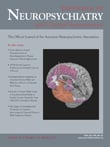To the Editor: We examine the case of a 44-year-old psychotherapist with onset of unilateral resting tremor and bradykinesia. In addition to her motor symptoms, she also reported episodes of laughing inappropriately during sessions with her patients. These episodes were sudden, explosive, paroxysmal, inappropriate, and involuntary. Examination and investigations were consistent with idiopathic Parkinson’s disease, and she was commenced on dopaminergic treatment. She showed an excellent response to medication and her pathological laughter ceased. While patients with idiopathic Parkinson’s disease are frequently known to show hyper emotionalism, this is the first report to describe pathological laughter and crying in the disease.
Case Report
A 44-year-old female psychotherapist presented to a neurology service complaining of a history of tremor and slowed movement. She first complained of increasing fatigue and developed a resting tremor. The tremor initially affected her right side but spread to involve both sides. In addition, she became increasingly slowed in her movement and began to have problems initiating movements and turning. She denied falls, visual hallucinations, visual problems, or urinary incontinence. She had no previous medical history and had not been taking any medication. There was no family history of movement disorders.
Over a period of a couple of months prior to presentation, she began to have episodes of laughing suddenly and uncontrollably during psychotherapy sessions with her clients. She did not find the subject matter she was laughing at funny, and she felt guilty and ashamed of her outbursts. Increasingly she was afraid that her career would suffer and that her clients would cease therapy. She also experienced similar laughter and crying in her daily life and as a result was increasingly avoiding family and friends. She had some symptoms of depression, and she felt her low mood was due to her movement difficulties and episodes of inappropriate laughter.
On clinical examination she had a predominantly postural tremor, though there was some resting tremor and cogwheel rigidity present, which was worse on the right side. She walked slowly with a festinant gait. Writing was micrographic. Her voice was hypophonic. She had normal range of eye movements and had very mild postural hypotension. Cognitive assessment showed no abnormalities. Executive function, in particular, was normal.
Radiographic tests showed no space occupying lesions or evidence of vascular events. Dopamine amine transporter (DAT) scan showed bilateral diminution of radioisotope accumulation in the caudate nuclei bilaterally especially on the left side, there was no uptake in putamen, and the findings were consistent with established dopaminergic degeneration.
A diagnosis of early onset idiopathic Parkinson’s disease with pathological laughter and crying was made. She was commenced on a trial of dopaminergic therapy, which significantly improved her mobility and also reduced her pathological laughter and crying.
Discussion
Pathological laughing and crying is also called intermittent explosive emotional dysregulation (IEED). The condition has also been called pseudobulbar affect but frequently occurs without any bulbar features. Similarly the condition has been called emotional lability, but this term is also used in a number of unrelated psychiatric disorders.
Emotional lability and hyperemotionalism have been previously reported in idiopathic Parkinson’s disease. Up to 40% of patients reported increased tearfulness since the onset of Parkinson’s disease, and 11% had more pervasive emotionalism.
1 Pathological laughing and crying has frequently been reported in multiple systemic atrophy.
2 However this patient clearly has idiopathic Parkinson’s rather than a Parkinson’s plus disease. Her symptoms are all typical of Parkinson’s disease, especially the unilateral nature of the tremor, presence of a resting tremor and excellent response to dopaminergic medication. While she had mild orthostatic hypotension, she had no other autonomic abnormalities or cerebellar signs. To date, this is the first case report to describe these symptoms of pathological laughter and crying in idiopathic Parkinson’s disease with response to dopaminergic treatment.

